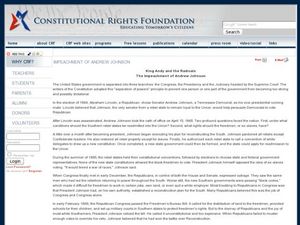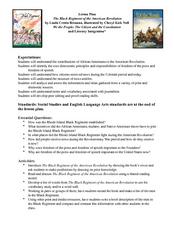Curated OER
Federalist 47
Students will analyze and evaluate political propaganda. In this lesson on the Federalist movement, students will examine the Federalist papers and analyze the Anti-Federalist argument mage against constitutional ratification. This...
Curated OER
Impeachment of Andrew Johnson
High schoolers examine the impeachment proceedings of Andrew Johnson. In this U.S. Constitution instructional activity, students listen to their instructor present a lecture on the details of Andrew Johnson's impeachment and...
Curated OER
The Role of the Executive Branch in the Lawmaking Process
Students research the Executive Branches role in making a law. In this law making lesson plan, students study the history of the Constitution and see how much power the President has in making a bill into a law. Students then research on...
Curated OER
State of the Union Bingo
High schoolers participate in a history game. In this State of the Union lesson, students follow the provided instructions and use the provided materials to play a Bingo game based in the President's annual address to Congress.
Curated OER
Worksheet #50 Questions - Amendments
In this historical quiz worksheet, students test their knowledge on multiple historical references that relate to the Bill of Rights and the Constitution. Students answer ten fill in the blank questions.
Curated OER
Ideas in Action Word Search
In this United States history word search worksheet, students locate 26 places, names, and terms pertinent to the Enlightenment which are hidden within the word puzzle. A word bank is included.
Curated OER
iCivics: State Government
Students explore the role of state government. In this civics lesson, students play an online game that requires them to consider the needs of state residents and the structure of state government.
Curated OER
U.S. History Worksheet #73
Explore how the 14th Amendment changed the way the United States operated, both politicallay and socially. In this United States history worksheet, students utilize a word bank of 10 terms or phrases to answer 10 fill in the blank...
Curated OER
Supreme court Decisions on Freedom of Religion
Eleventh graders analyze the limits and bounds of religious freedom issues in the United States through several Supreme Court case decisions.
Curated OER
Powers of Congress
Have your class fill out this comprehension sheet while reading about the powers of Congress. There are ten multiple choice questions focused on the rights, powers, and limitations of Congressional law.
National Endowment for the Humanities
George Washington: The Precedent President
Everyone knows that George Washington was the first president, but do your scholars know why that was so important? The lesson plan, the third in a sequence of three, allows learners to understand how George Washington set a precedent...
Benjamin Franklin Tercentenary
Benjamin Franklin, Elder Statesman
Ben Franklin was the only American to sign The Declaration of Independence, the Treaty of Alliance with France, the Treaty of Paris, and the US Constitution. An interesting resource explores his role in the latter by comparing the US...
DocsTeach
U.S. v. Amistad: A Case of Jurisdiction
Just what is jurisdiction and why does it matter? A helpful activity takes academics on a journey to understand how judicial jurisdiction works. Scholars read excerpts from the Constitution and court documents to understand the process...
Curated OER
Running for Freedom: The FUgitive Slave law and the Coming of the Civil War
In order to understand the complicated nature of slave laws during the Civil War, learners compare and contrast an abolitionist poster and a runaway slave ad. They use an attached worksheet to consider each primary source document, then...
Heritage Foundation
The Powers of the Executive
Are executives as powerful as they sound? High schoolers find out about the US president and executive branch. A variety of activities include scaffolded reading sections, research assignments, and collaborative group work.
Center for Civic Education
What Is Authority?
Young scholars examine the concepts of power and authority as they begin learning about government in this elementary social studies lesson. Through a series of readings, discussions, and problem solving activities, children learn about...
Judicial Branch of California
Our Government Today…What A System!
A group of citizens in North Canada has decided to leave their country, and they are asking for help in setting up an American-style democracy. Using a carefully structured activity, pupils lay out the principles in the American...
Constitutional Rights Foundation
Slavery and the Electoral College
How did slavery mold the creation of the US Constitution? The final lesson in the series focuses on how slavery impacted the creation of the Electoral College. Academics learn how the Electoral College was created because Southern states...
Curated OER
Lesson 1: The Importance of Rules in Our Country and in Our Classroom
Explore the importance of rules in a community with the engaging first lesson plan of this series on the US government. To begin, children play a paper clip game that requires them to make up their own rules as they go, after which the...
Curated OER
Liberty for All: Voices from the Revolution
Did the Declaration of Independence really intend to grant liberty for all? Get your class thinking about historical perspective with documents relaying the experiences of women, white men, and African-Americans during the Revolutionary...
Pacific University Oregon
Civil Rights: US History
To gain an understanding of the Civil Rights Movement of the 1960s, class members investigate the Jim Crow Laws, the Emancipation Proclamation, the 13th, 14th, and 15th Amendments of the US Constitution, and the 1898 Supreme Court case,...
Constitutional Rights Foundation
The Troubled Elections of 1796 and 1800
Congress does more than create new laws. Political scientists delve into the elections of 1796 and 1800 to understand how political parties, the Electoral College, and personal agendas affected the election process. The resource also...
New York State Education Department
US History and Government Examination: June 2011
Those who lived during the Great Depression could clearly draw a line between the roaring 1920s and the desolation of the following decade. Class members examine these two periods and compare them using an essay question prompt and...
Curated OER
We the People: The Citizen and the Constitution: The American Revolution
The contributions of African-Americans to the American Revolution are the focus of this Social Studies and language arts lesson. After reading and discussing Linda Crotta Brennan’s The Black Regiment of the American Revolution, class...
Other popular searches
- United States Constitution
- United Statesusus Constitution
- The United States Constitution
- Unites States Constitution

























